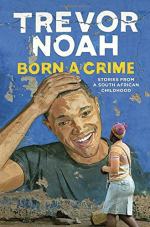
|
| Name: _________________________ | Period: ___________________ |
This test consists of 15 multiple choice questions and 5 short answer questions.
Multiple Choice Questions
1. To what was Patricia referring when she spoke of "the black tax" (66)?
(a) A special tax Afrikaners had to pay after apartheid to provide reparations to black people.
(b) The need to spend one's working life making up for that which was pillaged from one's ancestors.
(c) The tendency of white employers to illegally steal the wages of black employees during apartheid.
(d) An official government tax paid only by black people.
2. What made the author "realize [he] was black" (59)?
(a) Going to H. A. Jack Primary.
(b) Failing to get along with his white father.
(c) Going to an elite private school where students were socially integrated.
(d) Seeing his mother write "black" on a government census.
3. When does the author believe that a person is most themselves, according to the story "Pray, Trevor"?
(a) When suffering.
(b) When working.
(c) When defecating.
(d) When looking into the eyes of a loved one.
4. At the end of the foreword to the story "Born a Crime," the author wrote that apartheid would be easy for occupants of which country to understand?
(a) Costa Rica.
(b) America.
(c) Nigeria.
(d) England.
5. How does the author explain his remark that he and his mother "weren't just mother and son" (70)?
(a) "We were a team."
(b) "We never got along at all."
(c) "I was like her savior."
(d) "She was like my boss."
6. Why was the author unable to play with his cousins when he was very young?
(a) His grandmother was afraid the neighborhood children would steal him.
(b) His grandmother was afraid the police would take him away.
(c) His grandmother was afraid the cousins would be a bad influence on Trevor.
(d) Trevor was being punished.
7. What happened when the author tried to show his friend how to burn his name into pieces of wood?
(a) His friend wrote a bad word and blamed it on the author.
(b) The author and his friend started a moderately successful wood furnishing business.
(c) They wrote their names in the side of the house and got in trouble.
(d) They accidentally burned down the author's friend's house.
8. How did Patricia handle "major disputes" (84) with the author?
(a) She beat him.
(b) She wrote extra-length letters.
(c) She got other members of the family to help argue with him.
(d) She insisted on arguing in Xhosa.
9. Which tribe does the author describe as "thinkers"?
(a) The Zulu.
(b) The Sotho.
(c) The Xhosa.
(d) The Tswana.
10. Which tribe does the author describe as "warriors"?
(a) The Tswana.
(b) The Zulu.
(c) The Sotho.
(d) The Xhosa.
11. Which church does the author describe as "passionate" and "cathartic"?
(a) The mostly white church.
(b) The Chinese church.
(c) The multiracial church.
(d) The mostly black church.
12. How did Robert feel when Patricia asked him to impregnate her?
(a) He said he did not want a family.
(b) He said he did not like Patricia at all.
(c) He said he was not physically attracted to Patricia.
(d) He said he wanted to start a family right away.
13. How did the author react as a child when children in the neighborhood called him white?
(a) He was proud.
(b) He was worried.
(c) He thought they had their colors confused.
(d) He thought they were racists.
14. Who taught Patricia how to navigate Johannesburg without being deported to the Bantustans?
(a) Food vendors.
(b) Police.
(c) Prostitutes.
(d) Mini-bus drivers.
15. What crime did the author's parents commit when they had him?
(a) They each had intercourse with a person of another race.
(b) They kidnapped him from his real parents.
(c) They illegally crossed the border to have him in Swaziland.
(d) They hired an off-the-books midwife to deliver him.
Short Answer Questions
1. Why was the author surprised when Patricia insisted that he go see his father?
2. Why does the author compare Patricia to a "guerilla fighter" (84)?
3. What nationality is listed on the author's birth certificate?
4. What reason did Patricia give when the author asked why they did not move to Switzerland?
5. What language does the author indicate was especially valued for making prayers while he was growing up in Soweto?
|
This section contains 767 words (approx. 3 pages at 300 words per page) |

|




